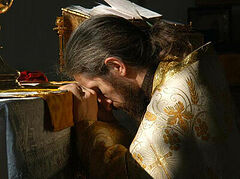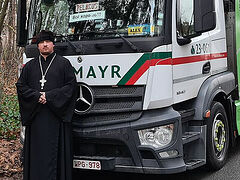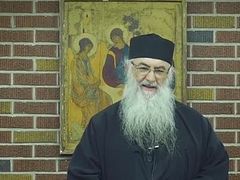Fr. Mikhail Kharchuk, rector of the Church of St. Seraphim of Sarov in the village of Konosha of the Arkhangelsk region, shares his observations and reflections on the spiritual life of contemporary Orthodox Christians.
 The closely-knit community of the Church of St. Seraphim of Sarov in Konosha, the Arkhangelsk Region
The closely-knit community of the Church of St. Seraphim of Sarov in Konosha, the Arkhangelsk Region
An interesting feature of this church is that the sanctuary is on the south side, not on the east. But it can’t be helped, since the church occupies a dilapidated wooden house, adapted for services. If the altar was situated according to all the canons, there simply wouldn’t be enough space for the parishioners. There is also another notable feature: the whole community participates in the Liturgy—the Eucharistic Canon, the Creed, the antiphons and often the litanies are sung by all parishioners. The service is not perceived in a detached way, when the priest worships separately at the altar, and the parishioners—separately behind the iconostasis. That is, the space in the church is common: there is no separation, even though there is an iconostasis. And the dialogue between the priest and the congregation is lively and conscious: “Forgive me, brothers and sisters!”—”May God forgive you, reverend father. Pray for us too.” These words are not just a tribute to tradition, but a prayerful conversation between the pastor and the flock. And when the greeting, “Christ Is Risen!”, resounds after the sermon at the Sunday Liturgy, you realize that Pascha, whether small or big, is the most important event not only in the Church year, but also in your life. And is it possible to do without the constant consoling Paschal greeting at the Church of St. Seraphim of Sarov? Its rector, Archpriest Mikhail Kharchuk, speaks.
***
The church in Konosha occupies the building of a former bank built in 1937. When in the late 1990s an Orthodox community appeared in this district center of the Arkhangelsk region, the faithful began to look for a place to hold services in, and the local authorities were able to offer only this building, which was in a disastrous state and even scheduled for demolition. We can see some symbolism in this episode: people’s faith was in a disastrous state too, and by some miracle, from the recent terrible past, from the years of persecution, the community was able to organize a church
 The Church of St. Seraphim of Sarov and the Church of the Resurrection of Christ under construction in Konosha
The Church of St. Seraphim of Sarov and the Church of the Resurrection of Christ under construction in Konosha
Konosha is just over 100 years old: the railway station was built in 1896, when, with the support of the celebrated industrialist Savva Ivanovich Mamontov (1841–1918), they laid the railway to Arkhangelsk, and then to Murmansk. There were churches and chapels in all the villages around; it is likely that there was a chapel at the new station, but unfortunately there is no precise information. And after the Bolshevik revolution in Russia and the bloody persecution, there could be no question of any church or chapel in the village or the district. And the population of the lands of Russia’s north grew greatly owing to prisoners and exiles. Konosha was no exception.
I have been serving as rector of our Church of St. Seraphim of Sarov since 2014. It is a typical story for a rural priest—pastoral care is inextricably linked with “the care of the walls”. That is, we had to save the ramshackle church building from falling into ruin. We had to redo everything: to change, reinforce, saw, plane, paint something and install central heating… We replaced the crosses on the roof—the old ones had already decayed and were falling. There was much to do, but thank God, we coped with everything. I am certain that the Venerable Seraphim, who was a good carpenter, helped us. He also helped us establish our community: having acquired the spirit of peace, the saint has always answered and still responds to our timid and awkward petitions to bring this spirit into our relations with one another. Without this spirit of peace and love it’s no use calling yourselves Orthodox; even if you do it thousands of times, there will be no Christian community. Over the years of my ministry here, I have realized the saving importance of patience: A priest cannot live without it. I also understood one more thing: the Apostle Paul speaks about it, addressing Christians in Corinth and indeed all of us, too:
Every one of you saith, I am of Paul; and I of Apollos; and I of Cephas; and I of Christ. Is Christ divided? was Paul crucified for you? or were ye baptized in the name of Paul? (1 Cor. 1:12-13).
 The priest should not attract people to his dear self, putting himself in the center of the community and of the universe (which, alas, happens), but only to Christ. Patience and humility—it seems to me that we should put maximum effort into cultivating these virtues in ourselves. Does it work? Well, not always. However, albeit weak and lame, we walk and crawl towards Christ—it cannot be otherwise.
The priest should not attract people to his dear self, putting himself in the center of the community and of the universe (which, alas, happens), but only to Christ. Patience and humility—it seems to me that we should put maximum effort into cultivating these virtues in ourselves. Does it work? Well, not always. However, albeit weak and lame, we walk and crawl towards Christ—it cannot be otherwise.
Over time, the community in Konosha began to grow—our deanery is large, and people from many villages of the district began to come to our small church. Such a small building, converted into a church, became cramped. So, seven years ago we decided to start building a new church; not a “room adapted for church use”, but a real new church. For a village like Konosha it will be a whole “cathedral”; it will be spacious and have two altars. It will be dedicated to the Resurrection of Christ, which is quite logical: what did St. Seraphim say to all those who came to him? “Christ is Risen, my joy!” When our ruling bishop was visiting us, he said that we needed a church in honor of the Resurrection of Christ—people should remember that the resurrection awaits us all and it’ll be good if we, having risen from the dead, were with Christ. It is also very symbolical: the lower church will be dedicated to St. Seraphim, and the upper one—to the Resurrection.
 Confessions at St. Elias Church in the village of Ponomarevskaya Construction has been going on for seven years now. Work continues every day. Maybe not as fast as we would like, but first of all we should remember the importance of patience, and secondly, more and more people have the opportunity to labor for a good cause, to learn how to do good. Therefore, time plays an educational role for the soul of a Christian. I am against the idea that God should give you what you ask for “at the first click”. First you should work hard, think, pray and start improving, and then there will be reasons for hope. Before we get dressed in wedding clothes, it makes sense to wash thoroughly; there is no point in going to the wedding feast if you are dirty. I believe that the difficulties we face when building a new church—whether it’s a lack of funds or workers, whether it’s the indifference of the secular authorities or something else—are useful.
Confessions at St. Elias Church in the village of Ponomarevskaya Construction has been going on for seven years now. Work continues every day. Maybe not as fast as we would like, but first of all we should remember the importance of patience, and secondly, more and more people have the opportunity to labor for a good cause, to learn how to do good. Therefore, time plays an educational role for the soul of a Christian. I am against the idea that God should give you what you ask for “at the first click”. First you should work hard, think, pray and start improving, and then there will be reasons for hope. Before we get dressed in wedding clothes, it makes sense to wash thoroughly; there is no point in going to the wedding feast if you are dirty. I believe that the difficulties we face when building a new church—whether it’s a lack of funds or workers, whether it’s the indifference of the secular authorities or something else—are useful.
What is important for the community today? According to my observations and experience, now we should pay special attention not so much to the quantity as to our quality as Christians. We shouldn’t bother about the numbers:
Ye are the light of the world. A city that is set on an hill cannot be hid. Neither do men light a candle, and put it under a bushel, but on a candlestick; and it giveth light unto all that are in the house. Let your light so shine before men, that they may see your good works, and glorify your Father which is in Heaven (Mt. 5:14–16).
If a person sees the light of the Gospel in us, he will definitely come here. The problem is that we ourselves should be the light of the world—that’s the point. I mean the responsibility of a Christian and taking yourself seriously. If I am Orthodox “on and off”, then there is little sense in my being Orthodox. Irresponsibility towards yourself also manifests itself when you refuse to think about your sins independently and to make efforts to get rid of them. “I have my father-confessor—I will do as he tells me.” In essence, these people say: “Let my father-confessor get rid of my sins for me.” “My priest (batiushka)” sounds like “my phone”, “my bag”, “my pug”—I feel pity for such priests. Again and again I remind many people about the words of Elder Nikolai Guryanov on this subject:
“Go to the church that is close to your home. Don’t look for anything special. There won’t be anything special. Confess your sins often and with the fear of God to any priest. For your sincere repentance the Lord will protect you from insincere people.”
It is not about monastic self-denial, but about an elementary desire to enter Paradise “for free”, without making efforts.
For quite a long time I pastored inmates of the high-security prison in the village of Yertsevo (the Arkhangelsk Region). I remember talking with a prisoner about salvation. I told him about the need of repentance, changing his life and way of thinking, and he answered me, “Listen, priest! I’ll sin to my heart’s content, I’ll enjoy my life, and before I die I’ll get baptized. What will your God do to me if all my sins are washed away, eh?” I snapped out to my own surprise: “Did you get anything wrong? Who do you want to deceive? God is not a simpleton, have you forgotten this?!” Hearing this, he even crouched down. Sometimes we have to remind other people that nothing in our lives is done automatically—we reap what we sow. The Church is not a service bureau—our labors, our efforts are required. It would seem that these are hackneyed phrases; but how many times and where else do we need to be hit so that we can understand it? Of course, it’s painful to see this.
But in addition to pain, I also feel joy, and this is the most important thing. I see with my own eyes the real transformation of a person’s soul, or I realize that the Gospel seed planted in his heart a few years ago is making itself felt, although I almost despaired. As I walk down the street, I meet a young mother with a stroller: “Oh, Fr. Mikhail! You baptized me some time ago. When can you come and baptize my baby? And I really miss the church!” Such a longing for God comforts me. They come and stay in the church, becoming permanent and conscious parishioners. Years ago, when I walked around the village, people would shy away from me (maybe it was the legacy of the Soviet era, or perhaps they were probably afraid of my appearance). And now I hear: “Oh, Father! Please bless me. I have a question...”
The presence of children in the church gives me special joy. Thank God, we managed to arrange a good Sunday school, and children attend it willingly. We try to avoid just cramming the catechism at classes, but we have a lively dialogue about the life of Christ, about the commandments, and what not. Our children draw and read. We also laugh together; it’s easy to do it with children. During holidays we have more children; they stand in a joyful and solemn manner. But even during the year, thank God, a lot of them come. I really hope that they perceive the church as their home—Russian people cannot be without children in churches! Of course, nowadays children will experience trials; but if we, adult Christians, help them learn Who helps us in all difficulties, delivers us from them and loves us the most, then we should not worry for our future. And we ourselves must live with God.



